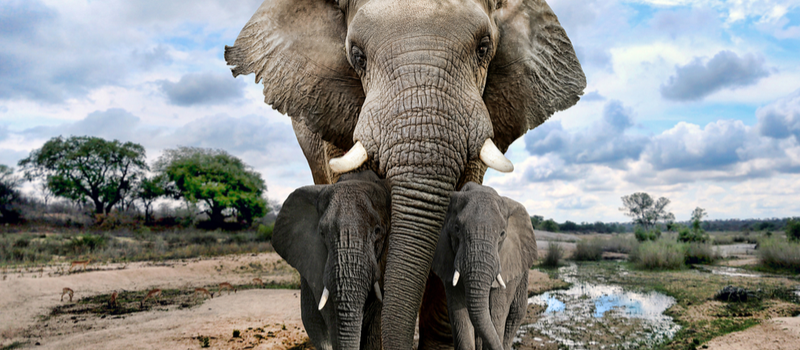Why The Elephant?

What Does The Elephant Represent?
1: Loyalty
2: Empathy/Compassion
3: Strong Family Bond
4: Attentiveness/Intelligence
5: Aggressiveness When Needed
6: Teamwork
7: Good Luck
1. Loyalty: Everything about the elephant represents loyalty. Whether it be to their family, their own kind or their very nature throughout thousands of years. Elephants have been known to spend time with the remains of their ancestors as they pass through those areas where family members have died. This can occur decades after their family members have passed away. It is a time where they can once again recognize the life, loyalty and respect of the individual that has passed.
2. Empathy/Compassion: Like humans, elephants have a very close-knit family bond. When fellow herd-members have been absent or fall behind, the herd shows great emotion when reunited. This manifests as a combination of vocalizations and touch. Certain anecdotes suggest their compassion extends to other creatures, as well. An elephant in India trained to lower heavy wooden posts into pre-made holes once refused to place one of them until a sleeping dog removed himself from the bottom of the hole. In most human societies, when an individual shows signs of pain or distress, we step in and provide support, care and comfort to that individual. This very same behavior has been witnessed in elephants.
3. Strong Family Bond: In both humans and elephants, the family bond can be very strong. The elephant will be exceedingly vigilant with their new offspring -- keeping the calf close, using their legs or trunk to nudge the child to its feet, even carrying the calf themselves if the terrain doesn't permit the new arrival to make it on its own. The passionate herd will protect the child from predators and even provide shade by standing over it. They will also bathe their child, and the herd will be quick to offer protection if the calf signals distress. Elephants will join together to save their own kind from a predator or a natural threat such as floods/rivers etc.
4. Attentiveness/Intelligence: Elephants have a high level of self-awareness and perception of their current environment. They regularly use their knowledge to adapt in the wild and perceive threats. The elephant claims the largest brain of any land mammal as well as an impressive encephalization quotient (the size of the animal’s brain relative to its body size). The elephant’s EQ is nearly as high as a chimpanzee’s. The elephant brain is remarkably similar to the human brain, with as many neurons and synapses, as well as a highly developed hippocampus and cerebral cortex. Elephants really do have an incredible ability to retain memories and experiences. They remember injuries they have incurred, and past times of hardship. For example, one study found that African elephants reacted with disdain to the sight or even smell of clothing worn by Maasai warriors (a tribe that used to hunt them). This ability to retain memories has led to anecdotal accounts where elephants have rejoiced when they recognized humans that they once bonded with after decades apart.
5. Aggressiveness When Needed: Persians and Indians used elephants at times of war. The war elephant would give the riders a high vantage point and could crush incoming foes. The war elephant was given armor to protect its ribs and a plate that would safeguard its brain. The thick hide of the elephant made it extraordinarily resistant to weaponry such as swords and axes. They were viewed as a very strong and powerful force. Elephants can become extremely aggressive in defending their own or handling perceived threats. An elephant will give their own life in defending those of their herd.
6: Teamwork: Elephants also understand teamwork: In a 2011 experiment, researchers in Thailand devised a system in which two elephants could reach a platform of food only if each elephant pulled at opposite ends of the rope simultaneously. Pulling at only one end provided no results, therefore requiring the two working together. Not only did all elephants work together to accomplish the task, but they understood the importance of a helping hand trunk. Elephants are also very collaborative in the wild and will always work together to overcome obstacles or predators.
7. Good Luck: The elephant was a sacred animal of the East. Hindus wear mascots of lucky charms in the form of an elephant (Ganesa), the elephant-headed god, who was the son of Shiva. By doing so they believe they will gain wisdom and foresight. It is also thought to remove all obstacles from their path – suggested, naturally, by the extraordinary strength of their idol. In the practice of feng shui, the elephant is a symbol of luck, power and fertility. When placed in other areas of the living space, elephant decor invites specific types of good fortune into the lives of the people who dwell there. Elephant representations with upward-facing trunks are viewed as good-luck symbols. In an office or study room, elephant decor symbolizes wisdom.
